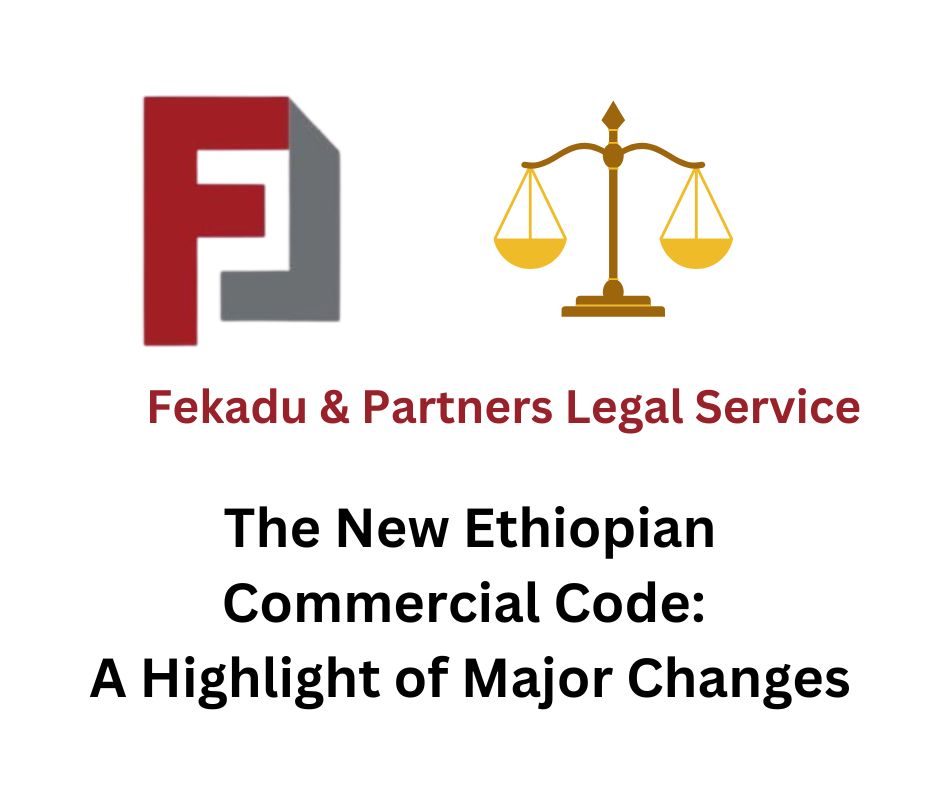By Fekadu Petros
Fekadu Petros & Partner Law Office
Posted on: March 27, 2021
On March 25, 2021, the Ethiopian Parliament passed a long-awaited reform: the Revised Commercial Code. This is a historic moment, considering that the previous Code—introduced in the 1960s—had remained unchanged for over six decades. While revolutionary at the time, the original Code became increasingly outdated, especially when compared with the legal systems of peer nations.
The new Code doesn’t simply replace the old; instead, it introduces targeted updates with a modern business landscape in mind. Among the most notable developments is the structural split of the existing code into two parts: the Commercial Code and the Financial Services Code (still in the works). Until the Financial Services Code is enacted, Books III and IV of the old code will remain in effect.
This post outlines the key changes introduced under the new Commercial Code—especially those in Book II: Business Organizations.
1. Abolition of the Ordinary Partnership
The concept of the ordinary partnership has been entirely removed. Often misunderstood and rarely used in practice, it created more academic debate than practical value. Its removal clears the path for more modern and efficient business structures.
2. Introduction of the Limited Liability Partnership (LLP)
Replacing the ordinary partnership is the Limited Liability Partnership (LLP)—a hybrid model that combines the simplicity of partnerships with the liability protection of companies. LLPs are reserved for professional services, such as law, auditing, and architecture.
3. One-Member Companies Now Allowed
Ethiopia now allows one-person private limited companies (PLCs). This addresses the long-standing issue where individuals had to add nominal partners just to meet legal requirements. Notably, while any individual or entity (except PLCs themselves) can establish a one-member company, this simplifies business formation—especially for foreign investors.
4. Outside Directors Can Serve on Boards
Under the old code, only shareholders could serve on company boards. The new law allows non-shareholder professionals to become board members—up to one-third of the board—allowing companies to attract experienced talent without needing to assign them shares.
5. Optional Supervisory Board Introduced
The new code permits companies to establish a two-tier board system: an executive board and a supervisory board. This is optional and gives companies more flexibility in designing governance structures. However, its practical impact on accountability and power distribution remains to be seen.
6. Simplified Incorporation – No Articles of Association Required
Previously, incorporation required both a Memorandum of Association (MOA) and Articles of Association. The revised law does away with the latter, streamlining the registration process. Existing companies may need to consolidate their MOA to reflect any provisions currently housed in their articles.
7. Enhanced Minority Shareholder Protections
A major leap forward is the strengthened protection for minority shareholders. Inspired in part by global standards and the World Bank’s Doing Business recommendations, several new provisions have been added:
- Mandatory Buyouts (Art. 292): If a shareholder acquires 90%+ of shares, minority shareholders can demand a buyout at a fair price.
- Director Accountability (Art. 328): Minority shareholders (10% ownership) can initiate legal action if directors harm the company.
- Convening Meetings (Arts. 351 & 366): Lower thresholds (down to 5%) for calling shareholder meetings.
- Access to Documents (Arts. 381 & 382): More transparency—minority shareholders can now access related party transactions and executive compensation.
- Special Audit Requests (Art. 396): Shareholders with 10% stake can request an independent audit or inspection.
8. Clear Board of Directors Structure for PLCs
The ambiguity surrounding whether PLCs could have a board of directors is now resolved. The new code formally allows it and sets clear rules on board size, appointment, and responsibilities.
9. Legal Recognition of Group Companies
Ethiopian law now formally recognizes groups of companies (parent-subsidiary structures), including foreign subsidiaries. This regulation outlines:
- Definitions of control, parent, and subsidiary
- Rules for cross-holdings and corporate governance
- Protections for minority shareholders in group structures
- Regulations against the misuse of business opportunities
While such structures existed informally, the new law provides a legal framework to govern them more transparently.
Final Thoughts
The Revised Ethiopian Commercial Code marks a significant milestone in the country’s legal and business reform journey. With clearer, more flexible, and investor-friendly laws, the changes aim to modernize Ethiopia’s commercial landscape and attract both local and international investments.
While the reforms are promising, real-world implementation and judicial interpretation will ultimately determine their success. Business owners, legal professionals, and investors should closely monitor how these changes unfold in practice.

